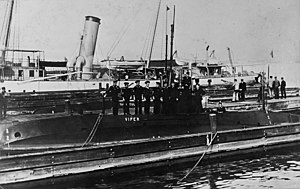USS B-1
 USS B-1 | |
| History | |
|---|---|
| Name | USS Viper |
| Builder | |
| Cost | $200,957.48 (hull and machinery)[1] |
| Laid down | 5 September 1905 |
| Launched | 30 March 1907 |
| Sponsored by | Mrs. Lillian Spear |
| Commissioned | 18 October 1907 |
| Decommissioned | 1 December 1921 |
| Renamed | B-1, 17 November 1911 |
| Fate | Sunk as a target, 1922 |
| General characteristics | |
| Class and type | B-class submarine |
| Displacement |
|
| Length | 82 ft 5 in (25.12 m) |
| Beam | 12 ft 6 in (3.81 m) |
| Draft | 10 ft 7 in (3.23 m) |
| Installed power |
|
| Propulsion |
|
| Speed |
|
| Range |
|
| Test depth | 150 feet (45.7 m) |
| Complement | 10 officers and enlisted |
| Armament | 2 × 18 inch (450 mm) bow torpedo tubes (4 torpedoes) |
USS B-1 (SS-10) was the lead ship of her class of submarines built for the United States Navy in the first decade of the 20th century.
Description
The B-class submarines were enlarged versions of the preceding Plunger class. They had a length of 82 feet 5 inches (25.1 m) overall, a beam of 12 feet 6 inches (3.8 m) and a mean draft of 10 feet 7 inches (3.2 m). They displaced 145 long tons (147 t) on the surface and 170 long tons (170 t) submerged. The B-class boats had a crew of one officer and nine enlisted men. They had a diving depth of 150 feet (45.7 m).[2]
For surface running, they were powered by one 240-brake-horsepower (179 kW) gasoline engine that drove the single propeller shaft. When submerged the propeller was driven by a 115-horsepower (86 kW) electric motor.[2] The boats could reach 9 knots (17 km/h; 10 mph) on the surface and 8 knots (15 km/h; 9.2 mph) underwater. On the surface, they had a range of 540 nautical miles (1,000 km; 620 mi) at 9 knots (17 km/h; 10 mph) and 12 nmi (22 km; 14 mi) at 4 knots (7.4 km/h; 4.6 mph) submerged.[3]
The B-class boats were armed with two 18 inch (450 mm) torpedo tubes in the bow. They carried two reloads, for a total of four torpedoes.[3]
Construction and career
B-1 was laid down by Fore River Shipbuilding Company in Quincy, Massachusetts, under a subcontract from Electric Boat Company of New Suffolk, Long Island, as Viper, making her the third ship of the United States Navy to be named for the viper.
Viper was launched on 30 March 1907 sponsored by Mrs. Lillian Spear, wife of Lawrence York Spear, Vice President of the Holland Torpedo Boat Company. The boat was commissioned on 18 October 1907. She reported to the Second Submarine Flotilla, Atlantic Fleet.
Service history
Viper cruised along the Atlantic coast on training and experimental exercises until going into reserve at Charleston Navy Yard on 30 November 1909. Recommissioned on 15 April 1910, she served with the Atlantic Torpedo Fleet until assigned to the Reserve Torpedo Group at Charleston Navy Yard on 9 May 1911. On 17 November, her name was changed to B-1.
In April 1914, B-1 was towed to Norfolk, Virginia, and later loaded aboard the collier Hector for transport to the Philippine Islands. Arriving at Olongapo, Luzon on 24 March 1915, B-1 was launched from the deck of Hector on 15 April and recommissioned two days later.
B-1 was assigned to the First Submarine Division, Torpedo Flotilla, Asiatic Fleet on 19 May 1915 and later served with the Second Submarine Division in Manila Bay's Naval Base Manila. On 1 December 1921, B-1 was decommissioned at Cavite, Philippine Islands, and subsequently used as a target.
See also
Notes
References
- Eger, Christopher L. (March 2021). "Hudson Fulton Celebration, Part II". Warship International. LVIII (1): 58–81. ISSN 0043-0374.
- Friedman, Norman (1995). U.S. Submarines Through 1945: An Illustrated Design History. Annapolis, Maryland: Naval Institute Press. ISBN 1-55750-263-3.
- Gardiner, Robert & Gray, Randal, eds. (1985). Conway's All the World's Fighting Ships 1906–1921. Annapolis, Maryland: Naval Institute Press. ISBN 0-85177-245-5.
- Wright, C. C. (2003). "Question 40/02: Submarines Expended as Targets 1922". Warship International. XL (4): 286–298. ISSN 0043-0374.
![]() This article incorporates text from the public domain Dictionary of American Naval Fighting Ships. The entries can be found here and here.
This article incorporates text from the public domain Dictionary of American Naval Fighting Ships. The entries can be found here and here.
External links
- Photo gallery of USS Viper at NavSource Naval History
